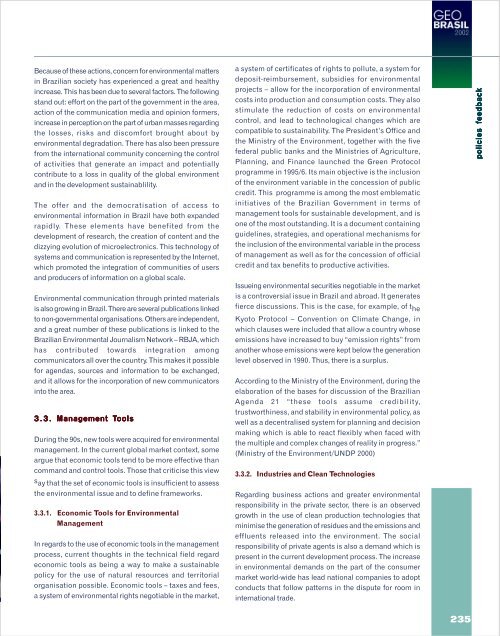GEO Brasil - UNEP
GEO Brasil - UNEP
GEO Brasil - UNEP
You also want an ePaper? Increase the reach of your titles
YUMPU automatically turns print PDFs into web optimized ePapers that Google loves.
Because of these actions, concern for environmental matters<br />
in Brazilian society has experienced a great and healthy<br />
increase. This has been due to several factors. The following<br />
stand out: effort on the part of the government in the area,<br />
action of the communication media and opinion formers,<br />
increase in perception on the part of urban masses regarding<br />
the losses, risks and discomfort brought about by<br />
environmental degradation. There has also been pressure<br />
from the international community concerning the control<br />
of activities that generate an impact and potentially<br />
contribute to a loss in quality of the global environment<br />
and in the development sustainablility.<br />
The offer and the democratisation of access to<br />
environmental information in Brazil have both expanded<br />
rapidly. These elements have benefited from the<br />
development of research, the creation of content and the<br />
dizzying evolution of microelectronics. This technology of<br />
systems and communication is represented by the Internet,<br />
which promoted the integration of communities of users<br />
and producers of information on a global scale.<br />
Environmental communication through printed materials<br />
is also growing in Brazil. There are several publications linked<br />
to non-governmental organisations. Others are independent,<br />
and a great number of these publications is linked to the<br />
Brazilian Environmental Journalism Network – RBJA, which<br />
has contributed towards integration among<br />
communicators all over the country. This makes it possible<br />
for agendas, sources and information to be exchanged,<br />
and it allows for the incorporation of new communicators<br />
into the area.<br />
3.3. Management Tools<br />
During the 90s, new tools were acquired for environmental<br />
management. In the current global market context, some<br />
argue that economic tools tend to be more effective than<br />
command and control tools. Those that criticise this view<br />
s ay that the set of economic tools is insufficient to assess<br />
a system of certificates of rights to pollute, a system for<br />
deposit-reimbursement, subsidies for environmental<br />
projects – allow for the incorporation of environmental<br />
costs into production and consumption costs. They also<br />
stimulate the reduction of costs on environmental<br />
control, and lead to technological changes which are<br />
compatible to sustainability. The President’s Office and<br />
the Ministry of the Environment, together with the five<br />
federal public banks and the Ministries of Agriculture,<br />
Planning, and Finance launched the Green Protocol<br />
programme in 1995/6. Its main objective is the inclusion<br />
of the environment variable in the concession of public<br />
credit. This programme is among the most emblematic<br />
initiatives of the Brazilian Government in terms of<br />
management tools for sustainable development, and is<br />
one of the most outstanding. It is a document containing<br />
guidelines, strategies, and operational mechanisms for<br />
the inclusion of the environmental variable in the process<br />
of management as well as for the concession of official<br />
credit and tax benefits to productive activities.<br />
Issueing environmental securities negotiable in the market<br />
is a controversial issue in Brazil and abroad. It generates<br />
fierce discussions. This is the case, for example, of t he<br />
Kyoto Protocol – Convention on Climate Change, in<br />
which clauses were included that allow a country whose<br />
emissions have increased to buy “emission rights” from<br />
another whose emissions were kept below the generation<br />
level observed in 1990. Thus, there is a surplus.<br />
According to the Ministry of the Environment, during the<br />
elaboration of the bases for discussion of the Brazilian<br />
Agenda 21 “these tools assume credibility,<br />
trustworthiness, and stability in environmental policy, as<br />
well as a decentralised system for planning and decision<br />
making which is able to react flexibly when faced with<br />
the multiple and complex changes of reality in progress.”<br />
(Ministry of the Environment/UNDP 2000)<br />
3.3.2. Industries and Clean Technologies<br />
policies feedback<br />
the environmental issue and to define frameworks.<br />
3.3.1. Economic Tools for Environmental<br />
Management<br />
In regards to the use of economic tools in the management<br />
process, current thoughts in the technical field regard<br />
economic tools as being a way to make a sustainable<br />
policy for the use of natural resources and territorial<br />
organisation possible. Economic tools – taxes and fees,<br />
a system of environmental rights negotiable in the market,<br />
Regarding business actions and greater environmental<br />
responsibility in the private sector, there is an observed<br />
growth in the use of clean production technologies that<br />
minimise the generation of residues and the emissions and<br />
effluents released into the environment. The social<br />
responsibility of private agents is also a demand which is<br />
present in the current development process. The increase<br />
in environmental demands on the part of the consumer<br />
market world-wide has lead national companies to adopt<br />
conducts that follow patterns in the dispute for room in<br />
international trade.<br />
235
















